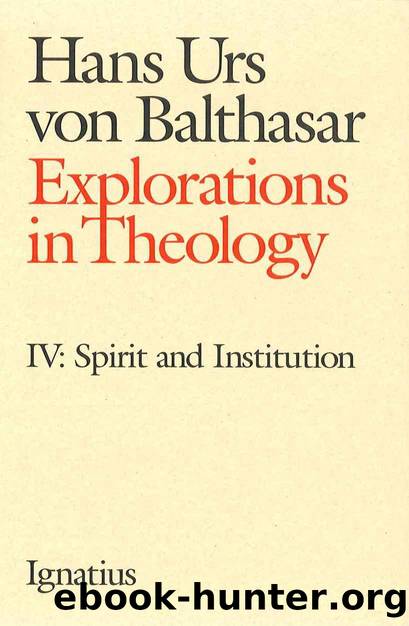Explorations in Theology, Vol. 4: Spirit and Institution by Hans Urs von Balthasar

Author:Hans Urs von Balthasar [Balthasar, Hans Urs von]
Language: eng
Format: epub
Tags: Spiritual & Religion
ISBN: 9780898705430
Published: 2013-09-13T04:00:00+00:00
4
Certainly one can also see the continuity here between Old and New Covenants. For the people of the Old Covenant were âled out of the house of bondageâ by Godâs active Word calling them out of Egypt and sustaining them in their trials of the exodus.
And through this active Word they became his people. And it is this same active Word of God that became flesh in Jesus Christ, through whom the new People of God were called into being. Both the new and the old People of God must remain aware of their Creator, who has set them free and continues to guard them, that they might remain the people they are meant to be.
But the discontinuity is just as great, if not greater. The âpeople according to the fleshâ was placed before God by a unique action of Godâs Word. It is formed as a people once and for all by being addressed and led by God. The spiritual Israel, the Church, however, springs up anew from each individualâs relationship to God in Christ: that birth from God that is given in baptism tears the individual away from the natural horizontal bonds with other men. He is now a ânew creationâ (2 Cor 5:17; Gal 6:15); he lives a ânew lifeâ (Rom 6:4) and is a ânew manâ (Eph 4:24; Col 3:10), whose social continuity with his fellow man can be brought about only through Jesus Christ. Only Jesus is the one who, in the mandate of the Father and the power of the Holy Spirit, issues the Church from himselfâincluding the visible Church in her actuality and structure, as well as the large, potential Church that is mankind as a whole. For it was for all men that Jesus gave satisfaction and merited eternal life.
So conversion is simultaneously reconciliation with God and with oneâs brothers. But reconciliation with the latter is a logical consequence of the first: for my fellow man becomes my brother through and in Christ. But it can sometimes occur that what follows in the order of logic can precede in time, as when oneâs brother takes on the task of reprimanding the sinner and leading him to conversion according to the mandate of Christ. The letters of the apostles are filled with such instructions to give fraternal correction, as they themselves once did as Christâs disciples according to the explicit instructions in the Gospels (Mt 18:15-20).
For now oneâs brother can represent Christ and can initiate the process of the sinnerâs personalization by taking him aside (âbetween the two of usâ). And inasmuch as we are all in more or less danger of lapsing, this process can also be a thoroughly mutual one (except in cases when the sinner has forfeited his place in the community, when it is the duty of the authority of office to proceed). But otherwise, âadmonish one anotherâ (Col 3:16 and throughout the letters). For both parties know that they have been called and instructed by Christ, and therefore
Download
This site does not store any files on its server. We only index and link to content provided by other sites. Please contact the content providers to delete copyright contents if any and email us, we'll remove relevant links or contents immediately.
The Lost Art of Listening by Michael P. Nichols(6476)
Why I Am Not A Calvinist by Dr. Peter S. Ruckman(3772)
The Rosicrucians by Christopher McIntosh(3053)
Wicca: a guide for the solitary practitioner by Scott Cunningham(2708)
Signature in the Cell: DNA and the Evidence for Intelligent Design by Stephen C. Meyer(2503)
Real Sex by Lauren F. Winner(2479)
The Holy Spirit by Billy Graham(2420)
To Light a Sacred Flame by Silver RavenWolf(2356)
The End of Faith by Sam Harris(2293)
The Gnostic Gospels by Pagels Elaine(2029)
Nine Parts of Desire by Geraldine Brooks(2010)
Waking Up by Sam Harris(1960)
Heavens on Earth by Michael Shermer(1956)
Devil, The by Almond Philip C(1903)
Jesus by Paul Johnson(1890)
The God delusion by Richard Dawkins(1851)
Kundalini by Gopi Krishna(1826)
Chosen by God by R. C. Sproul(1765)
The Nature of Consciousness by Rupert Spira(1691)
